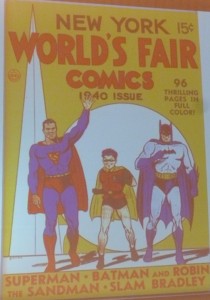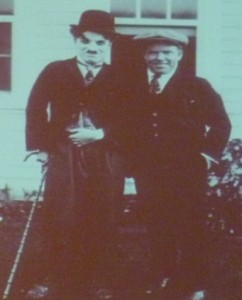Remembering Nick Webb, a Bright Light in British Publishing

 Via the Guardian comes a lovely memorial by longtime British publisher Ion Trewin bearing the sad news that the sparkling, smart Nick Webb–who as science fiction editor of Pan Books commissioned Douglas Adams to turn his BBC radio drama “The Hitchhiker’s Guide to the Galaxy” into an international bestselling book–has died at age 63. According to Trewin’s obit, the first book of what would become the multi-volume science fiction series sold 250,000 copies within three months of publication in 1979 and a million copies by 1984, in the U.K. alone. Meantime, in the U.S., where I was then running Undercover Books, my bookstore in Cleveland, we stacked up and sold the well-priced little hardcover from Crown Publishers, reordering it repeatedly for months.
Via the Guardian comes a lovely memorial by longtime British publisher Ion Trewin bearing the sad news that the sparkling, smart Nick Webb–who as science fiction editor of Pan Books commissioned Douglas Adams to turn his BBC radio drama “The Hitchhiker’s Guide to the Galaxy” into an international bestselling book–has died at age 63. According to Trewin’s obit, the first book of what would become the multi-volume science fiction series sold 250,000 copies within three months of publication in 1979 and a million copies by 1984, in the U.K. alone. Meantime, in the U.S., where I was then running Undercover Books, my bookstore in Cleveland, we stacked up and sold the well-priced little hardcover from Crown Publishers, reordering it repeatedly for months.
Trewin, who now works as literary director of the Man Booker Prize, clearly knew and liked Webb, the voluble son of an Irish pop and a Jewish mom. “He had a vivid sense of humour, often word-based, and delighted in mixed metaphors, once relating hearing someone say: ‘I smelled a rat and nipped it in the bud.’ Many years later the memory would still make him chortle. In conversation he used words and phrases that were inimitably his own. The acquisition of the first Hitchhiker novel was hardly considered a big deal, he recalled, or as he put it: ‘I was not proposing that we spend serious sponduliks.'” I met Nick Webb once, at a Frankfurt Book Fair when I was with Kodansha America, and enjoyed telling him I’d sold Adams’ novels in my bookstores. I liked him instantly.
Sadly, Douglas Adams also died, in 2001 at fifty-one. Happily, he and Webb left a remarkable legacy–one of the funniest, most brilliant pieces of science fiction published in the second half of the twentieth century.

 This morning I met an author whose work I really admire. My breakfast mate was Jim Higdon, author of The Cornbread Mafia: A Homegrown Syndicate’s Code of Silence and the Biggest Marijuana Bust in American History, which is officially released tomorrow. I’d never met Jim, though I had a role in insuring that his book had a chance to get published. When I read the draft manuscript I wasn’t in a position to publish it myself, but I really enjoyed this gonzo true-crime narrative, and so recommended it to longtime Carroll & Graf colleague and friend, Keith Wallman, now an editor at Lyons Press. It was precisely the sort of book he and I combined to edit and prepare for publication many times, with books like David Pietrusza’s Rothstein: The Life, Times, and and Murder of the Criminal Mastermind Who Fixed the 1919 World Series; Barbara Raymond’s The Baby Thief: The Untold Story of Georgia Tann, the Baby Seller Who Corrupted Adoption; Alan Bisbort’s “When You Read This, They Will Have Killed Me”: The Life, Redemption, and Execution of Caryl Chessman, Whose Execution Shook America; and Chuck Kinder’s Last Mountain Dancer: Hard-Earned Lessons in Love, Loss, and Outlaw Honky-Tonk Life, to name only four of many dozen books we published together.
This morning I met an author whose work I really admire. My breakfast mate was Jim Higdon, author of The Cornbread Mafia: A Homegrown Syndicate’s Code of Silence and the Biggest Marijuana Bust in American History, which is officially released tomorrow. I’d never met Jim, though I had a role in insuring that his book had a chance to get published. When I read the draft manuscript I wasn’t in a position to publish it myself, but I really enjoyed this gonzo true-crime narrative, and so recommended it to longtime Carroll & Graf colleague and friend, Keith Wallman, now an editor at Lyons Press. It was precisely the sort of book he and I combined to edit and prepare for publication many times, with books like David Pietrusza’s Rothstein: The Life, Times, and and Murder of the Criminal Mastermind Who Fixed the 1919 World Series; Barbara Raymond’s The Baby Thief: The Untold Story of Georgia Tann, the Baby Seller Who Corrupted Adoption; Alan Bisbort’s “When You Read This, They Will Have Killed Me”: The Life, Redemption, and Execution of Caryl Chessman, Whose Execution Shook America; and Chuck Kinder’s Last Mountain Dancer: Hard-Earned Lessons in Love, Loss, and Outlaw Honky-Tonk Life, to name only four of many dozen books we published together.
 Hiding in plain sight is confirmation in
Hiding in plain sight is confirmation in  #FridayReads The New Yorker‘s excerpt from Robert Caro’s fourth volume in his long-running LBJ bio. Powerful narrative of the day JFK was killed and LBJ took office, and how this picture came to be taken by WH photographer Cecil Stoughton. As readers of this blog may recall, I’ve had opportunities to
#FridayReads The New Yorker‘s excerpt from Robert Caro’s fourth volume in his long-running LBJ bio. Powerful narrative of the day JFK was killed and LBJ took office, and how this picture came to be taken by WH photographer Cecil Stoughton. As readers of this blog may recall, I’ve had opportunities to 

